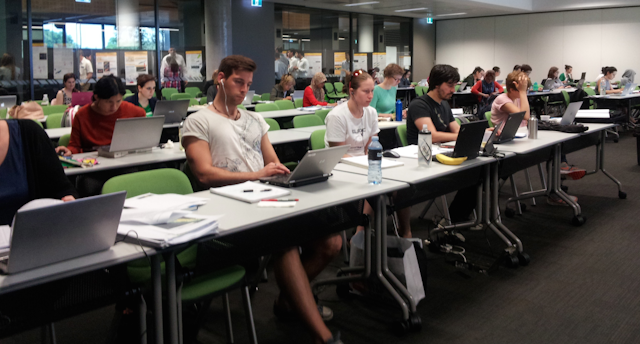November is academic writing month (AcWriMo) – an annual academic write-a-thon aimed at uniting people around the world by a common goal of developing better and sustainable writing habits.
It is just one of a number of research writing events to have gained traction in the US and Australia in particular over the last five years.
Examples include writing boot camps, where PhD students write large amounts of their thesis in the company of others for two to three days at a time, and the “shut up and write” initiative, where doctoral students and academics meet in a cafe to write.
These events are resource-minimal, cost-effective social gatherings, often supported by social media.
They don’t necessarily require expert facilitators or a university’s approval.
The aim is to be social. The events can also feature games and timed activities, as well as soft competition and rewards for meeting personal writing goals.
There are also now apps to help writers write to time, monitor productivity and even gamify their writing.
This focus on production – quantity over quality – while attracting some criticism for underplaying the importance of thoughtful, slow and iterative writing practices, has not diminished the growing enthusiasm.
At the University of New South Wales, we have just run our fourth writing boot camp and continue to be surprised at the numbers of doctoral students prepared to spend two-and-a-half days writing together silently in a room from 9am to 6pm.
Australian National University, La Trobe, Melbourne and Adelaide universities report similar enthusiasm by doctoral students for such events.
So why are these events so popular?
We suggest there are two contributing factors.
Firstly, expansion of research degree programs globally and the highly competitive research funding context have shifted the spotlight onto research writing.
For many researchers, producing publications during a PhD is now a necessity for securing employment, postdoctoral appointments and promotions.
In some countries such as China, it is [obligatory for PhD students](http://www.mdpi.com/2304-6775/3/1/27htm “) to publish during candidature in order to graduate.
The desire for such output-focused programs is an inevitable consequence of this pressure to publish.
Secondly, studying for a PhD is an intensely difficult and often lonely task for which appropriate help is not always available.
Supervisors have reported lacking the necessary time, confidence and skills to properly support their students’ writing.
The notion of the lone-ranger researcher is still a powerful force, especially in the humanities and social sciences. There is a stigma attached to admitting difficulties associated with writing.
Large social events that normalise writing and collegiality are therefore attractive to early career academics.
There is currently little research into the popularity and long-term impacts of these writing events – but work that has been done in this area documents the efficacy of writing in groups for improving productivity and building skills, confidence and collegiality among scholars.
It’s clear that students are embracing these opportunities to work with others in an environment that prioritises a disciplined approach to writing.
Five benefits to joining research writing events:
- Increased productivity – without a doubt, you’ll write more!
- Collegiality – meet new people, have fun and remove the angst and agony of writing alone.
- Establish local and international networks that can last for years.
- Learn about yourself as a writer – understand how to beat procrastination and push through even the toughest patch.
- Learn writing know-how – take advantage of a wealth of resources and support through linking into associated social media supports.
Share your experience of research writing events in the comments section below or Tweet us @ConversationEDU

